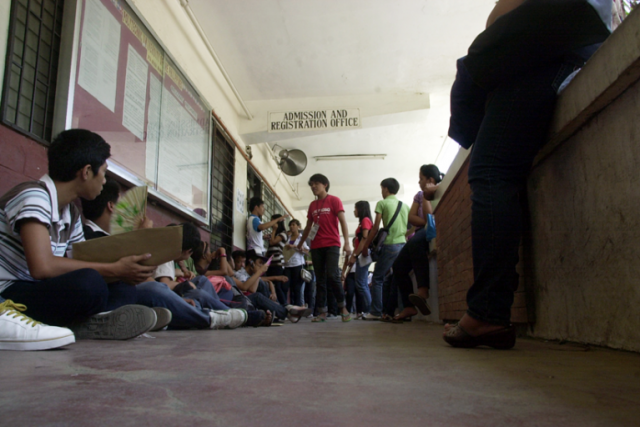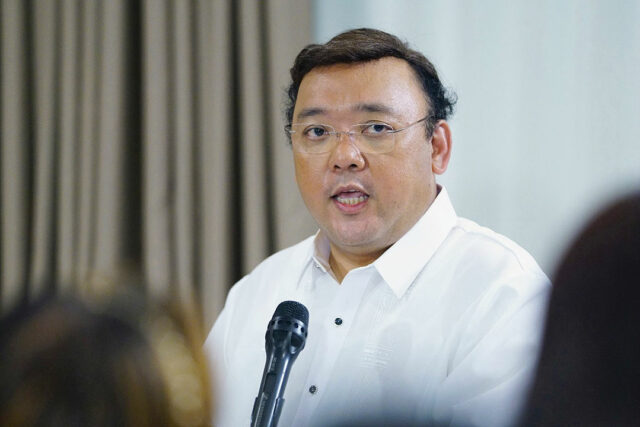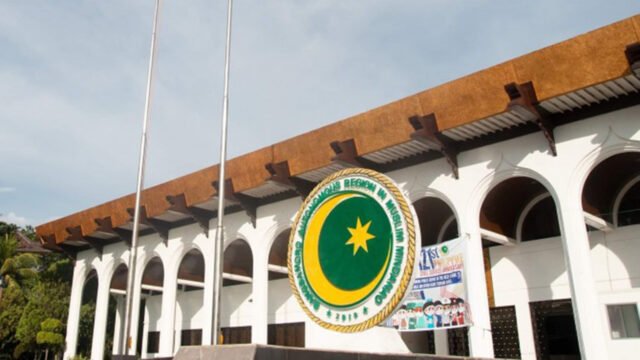 By Chloe Mari A. Hufana, Reporter
By Chloe Mari A. Hufana, Reporter
REGISTRATION on Tuesday opened in the Philippines for midterm elections next year, headlined by what could be a bitter proxy battle between President Ferdinand R. Marcos, Jr. and his firebrand predecessor Rodrigo R. Duterte.
Seventeen senatorial and 15 party-list hopefuls formalized their candidacies at a Commission on Elections (Comelec) satellite office inside the Manila Hotel, Comelec Chairman George Erwin M. Garcia told a news briefing.
The May 2025 elections will be a litmus test of Mr. Marcos’ popularity and a chance to consolidate power and groom a successor, which the influential Duterte family has signaled it is determined to stop after an acrimonious falling out.
Philippine presidents are limited to a single six-year term.
Though 317 seats at the House of Representatives and thousands of regional and city posts are up for grabs among 18,000 positions, the attention is on 12 spots in the 24-seat Senate, a high-profile chamber with outsized influence and typically stacked with political heavyweights.
Speculation has swirled that Mr. Duterte, 79, and two of his sons will contest the senatorial race to try to weaken Mr. Marcos. Mr. Duterte’s office and that of his daughter, Vice-President Sara Duterte-Carpio, did not immediately respond to requests for comment.
The midterms come after the collapse of what was an unstoppable alliance between the two families that delivered a landslide election win for Mr. Marcos in 2022. Ms. Carpio had been the frontrunner for president in surveys but opted instead to become Mr. Marcos’s running mate.
But their relationship has since turned hostile, owing to policy differences, the unravelling of Mr. Duterte’s pro-China foreign policy and investigations into his bloody war on drugs, plus other scandals implicating his associates.
Ms. Carpio resigned from the Cabinet and last week suffered a humiliating two-thirds slashing of her office’s budget by a House led by the President’s cousin, after she refused to attend hearings and objected to scrutiny of her spending.
Senate seats could give the Dutertes a powerful platform in the Philippines’ personality-driven politics to shore-up support, challenge Marcos legislation and initiate investigations into his government.
“All eyes will be indeed on who among them would run… or all of them,” said Ederson Tapia, professor of public administration at the University of Makati. “The Dutertes, notwithstanding the controversies hounding VP Sara, remain a formidable force.”
Mr. Marcos is bolstering his base by endorsing big local names for the Senate, including three former movie actors, the daughter of the country’s richest man, plus two of his presidential election rivals, among them global boxing icon Emmanuel “Manny” D. Pacquiao, Sr.
A notable absence from his Senate slate will be sister Maria Imelda “Imee” R. Marcos, who is seeking reelection but declined her brother’s endorsement, which she said was to avoid putting him in a difficult position.
Jean Encinas-Franco, a political science professor at the University of the Philippines, said success for Mr. Marcos in the midterms could be vital to his legacy.
“If the majority of those he endorsed win in the Senate and the House, it ensures that his legislative agenda will push through,” she said. “It ensures that he will have enough clout to anoint someone who he is going to support in the 2028 (presidential) elections.”
Senator Francis N. Tolentino, who is running under the ruling Alyansa para sa Bagong Pilipinas, was the first among seven reelectionists to file his bid.
Bayan Muna party-list, which lost its re-election bid in the previous election, is seeking a comeback with human rights lawyer Neri J. Colmenares as its first nominee, followed by ex-House Deputy Minority Leader Carlos Isagani T. Zarate and for representative Ferdinand R. Gaite.
Meanwhile, at a separate filing office in Makati, outgoing Senator Ma. Lourdes “Nancy” S. Binay-Angeles filed her certificate for Makati mayor. Her sister, outgoing Mayor Mer-len Abigail S. Binay-Campos, has said her husband was eyeing the post.
Speaker Ferdinand Martin G. Romualdez in a Facebook post said he is gunning for his sixth term in the House as Leyte’s representative. He filed his certificate in the province.
MAGIC 12
Meanwhile, senatorial candidates from the ruling coalition got 10 of 12 spots in the race, according to a survey by the Social Weather Stations.
The study, commissioned by Stratbase Group, showed that leading the race was Party-list Rep. Erwin T. Tulfo with 54% of Filipinos likely to vote for him.
He was followed by former Senate President Vicente C. Sotto III with 34%, and Senator Pilar Juliana “Pia” S. Cayetano with 31%.
Hansley A. Juliano, a political science professor at the Ateneo de Manila University, said Senate independence is unlikely to be affected in case most administration candidates win.
“Independence wise, we have seen before that the Senate, depending on their composition, can choose to be as supine to the President as the lower House or try to fight out its institutional independence,” he told BusinessWorld in a Facebook Messenger chat.
Mr. Duterte’s preference rate dipped to 25% in September from 36% in March, putting him in the 4th-5th place from second. Tied with him was Senator Marcos, whose support increased by 3 points to 25% in September.
In the sixth and seventh spots were Senator Ramon “Bong” B. Revilla, Jr. and ex-Senator Panfilo M. Lacson, Sr.
House Deputy Speaker and Las Piñas Rep. Camille Lydia A. Villar-Genuino climbed to the eighth spot in September with 21% from 20th-24th place in March.
Ms. Binay-Campos entered the “magic 12” on the ninth to 10th spot, tied with Senator Manuel “Lito” M. Lapid at 20%.
“Dynastic names continue to dominate Senate races both due to name recall, incumbency and previous publicity record,” Mr. Juliano said. “This clientelist standard continues to persist to the detriment of newer and more professional voices, even if young people may be inclined to vote for progressive candidates.”
From the administration slate, only Mr. Tolentino (14th) and Interior Secretary Benjamin C. Abalos, Jr. (16th-17th) failed to make it to the top 12.
The filing of candidacies will end on Oct. 8. — with Reuters


 By Chloe Mari A. Hufana,
By Chloe Mari A. Hufana, 








